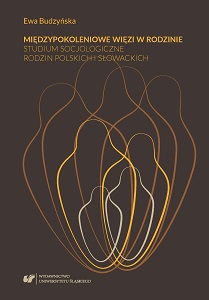Międzypokoleniowe więzi w rodzinie. Studium socjologiczne rodzin polskich i słowackich
Intergenerational ties in the family. A sociological study of Polish and Slovak families
Author(s): Ewa Budzyńska
Subject(s): Social Sciences, Sociology, Family and social welfare
Published by: Wydawnictwo Uniwersytetu Śląskiego
Keywords: family; social ties; intergenerational ties
Summary/Abstract: Since the second half of the 20th century we have been witnessing serious changes in the area of a Western family. These changes encompass all spheres of family life – demographic, cultural (axionormative) and economic – and in this way they contribute to the multiplication of family types. Thus, apart from marriages there appear non-marriage families, apart from complete families there are more and more half-families characterized by a specific kind of matriarchy due to the constant absence of the father. Moreover, apart from permanent families there are families reconstituted after a divorce; apart from families with only one child, and even those that from the very beginning of the relationship rule out the possibility of having children (single-parent families), we can find numerous families; apart from traditional big families extended horizontally, with numerous collateral relatives, territorially settled, there are more and more multigenerational families that are vertically extended, with relatives restricted to lineal blood relation, frequently geographically scattered; apart from families formed by indigenous inhabitants of the West, which is characterized by individualistic culture, more and more common are immigrant families, deriving from countries of familistic cultures, like Asia, Middle East, North Africa, Central and South America, which continue the tradition of intergenerational mutual support.
The consequence of this phenomenon are the changes taking place in intergenerational relations within individual family types. Current studies conducted on the quality of family ties (e.g. by Vern L. Bengtson on American family ties and by Leon Dyczewski on intergenerational relation in Polish families) have demonstrated that in contemporary families the generations are still strongly attached to one another. However, inasmuch as formerly the ties were grounded on solid material bases, today their essence is constituted by the affective attitudes of sympathy or antipathy – either facilitating mutual support, reviving interpersonal communication, aiding intergenerational transfer of values, or contributing to cooling off the intergenerational relations, and even (infrequently) to their loss. Therefore, the relations that are still maintained are solidarity relations, as well as emotional, axiological, and in particular communicative ones, and even if some intergenerational conflicts do appear, they typically do not lead to a dramatic break off with the family. The research on the intergenerational ties has also indicated a wide variety of relation types and the degree of their intensification, depending on the direction of the intergenerational tie.
The research that well corresponds with such a wide context of views and studies on intergenerational ties is the study on the ties in Polish and Slovak families evaluated by adult, although not yet independent, children. The research has been conducted in 2012 among young students (1047 persons) of two universities: the University of Silesia in Katowice (Poland) and the Constantine the Philosopher University in Nitra (Slovakia). In order to evaluate the research results, an original conception of family ties has been devised, which encompasses the following types of ties: material, object, auxiliary, communicative, emotional, axiological, religious, and recordal.
The obtained research results have shown that both the Polish as well as the Slovak families, situated in the countries of similar culture, though of different history, still constitute a strong community of ties, which is especially evident in the case of emotional and auxiliary ties supported by intensive contacts. On the other hand, the least exposed is the material (especially residential) and recordal tie. Moreover, the analyses have demonstrated that young people are deeply interested in supporting intergenerational relations despite some worldview differences and even conflicts which emerge in some spheres. These differences, however, do not result in the attitudes involving breaking away from the family or rejecting it. The intensification of ties in individual dimensions is modified by respondents’ nationality and the degree of their religiousness in terms of their own declaration of faith, while the sex of the respondents has little effect on the intensity of relations.
On the basis of the results obtained a conclusion can be drawn regarding the domination of both the Slovak (in higher degree) and Polish (in lesser degree) families by centripetal force which facilitates family integrity. This suggests that integrational processes in the families under scrutiny predominate over disintegrational ones, and the intrafamily ties outweigh extrafamily ties, while the family itself, in both countries being the support for its members during the difficult Times of communist totalitarianism as well as the subsequent political transformation, still performs the function of providing various kinds of assistance and rewarding relations for the young generation. Therefore, the Polish and Slovak families contain more features of the traditional type of family than of the modern type.
The obtained picture of the intergenerational ties in the Polish and Slovak families conforms to the research results arrived at by other sociologists, both Polish (e.g. Leon Dyczewski, Hanna Świda-Ziemba, Janusz Mariański) as well as American (Vern L. Bengtson, Karl Pillemer, Andrew J. Cherlin) that confirm the thesis that in contemporary families there exist ties that integrate the generations of children, parents, and grandparents.
Series: Nauki społeczne
- E-ISBN-13: 978-83-226-3273-4
- Print-ISBN-13: 978-83-226-3272-7
- Page Count: 486
- Publication Year: 2018
- Language: Polish
- eBook-PDF
- Sample-PDF
- Table of Content
- Introduction

